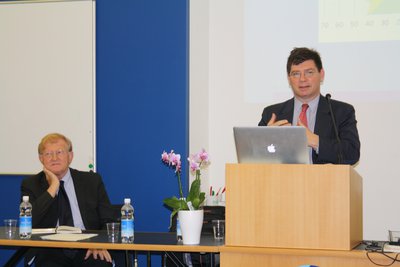12 Jun 2015
Open borders to migrants, urges UN migrants' rights rapporteur
François Crépeau, United Nations Special Rapporteur on the Human Rights of Migrants, called on European countries to accept more refugees and economic migrants in a lecture at the World Trade Institute on 12 June entitled “A new approach to migration: Open the doors!”
Crépeau, who is also Oppenheimer Professor of International Law at McGill University in Montreal, argued that the Global North should adopt a human-rights-based framework for migration and mobility that would include a plan to resettle a large number of refugees and to facilitate and regulate migrant mobility.
“We are all migrants; migration is the normal state of humanity,” he pointed out, adding that irregular migrants show extreme courage in leaving a hopeless situation. Irregular migrants generally act out of an effort to support members of their family.
The military response to irregular immigration was “extremely short-sighted”, Crépeau said. Harm reduction policies were needed instead of restrictive policies.
“To reduce human suffering we need regulated openness,” the UN rapporteur said, calling for search and rescue efforts at sea to be increased.
“Those on the boats are human beings, and like us have rights. Saving lives is more important than protecting borders.”
Resettlement
Crépeau said that Europe would face the same problems this summer as last with operations by people smugglers. Some 700,000 people had already arrived in Europe on smugglers’ boats since January, and the peak season had not yet arrived.
The inaction of Europe over the past four years is actually what creates the market for smugglers, he believes. Collective resettlement programmes and mechanisms are needed: the Global North should resettle at least one million refugees over the next five years, according to an agreed-upon distribution key.
Given the hundreds of thousands of Syrians in urgent need of resettlement, Europe needs to do more to resettle and integrate immigrants, he said. The people themselves need to be involved in the decision-making about where they are resettled. Giving immigrants mobility options would reduce reliance on people-smugglers.
Forty percent of those who came to Europe last year were not refugees but economic migrants, the UN rapporteur underlined. These people will keep coming because of a lack of economic opportunities at home and because there are jobs available. “Migrants go where there are jobs, and jobs are a pull factor,” he said, adding that Europe needs to work on reducing underground labour markets.
François Crépeau was appointed United Nations Special Rapporteur on the Human Rights of Migrants in 2011.
In April 2014 Prof. Crépeau was key speaker at a migration workshop at the WTI organised by researcher Rosa Losada. That was followed in February of this year by a conference and seminar series on migration issues co-hosted with McGill University and held in Montreal.
Further info
Text of Prof. Crépeau's lecture


